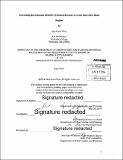| dc.contributor.advisor | Lawrence Susskind. | en_US |
| dc.contributor.author | Hess, Sara Lynn | en_US |
| dc.contributor.other | Massachusetts Institute of Technology. Department of Urban Studies and Planning. | en_US |
| dc.coverage.spatial | n-us-wv n-us-pa | en_US |
| dc.date.accessioned | 2014-09-19T21:45:37Z | |
| dc.date.available | 2014-09-19T21:45:37Z | |
| dc.date.copyright | 2014 | en_US |
| dc.date.issued | 2014 | en_US |
| dc.identifier.uri | http://hdl.handle.net/1721.1/90200 | |
| dc.description | Thesis: M.C.P., Massachusetts Institute of Technology, Department of Urban Studies and Planning, 2014. | en_US |
| dc.description | Cataloged from PDF version of thesis. | en_US |
| dc.description | Includes bibliographical references (pages 97-103). | en_US |
| dc.description.abstract | My thesis seeks to explore the challenge of value capture from natural resources using the case of the Marcellus Shale in West Virginia and Pennsylvania as an exemplar. I examine the mechanisms in place to capture the economic benefits of shale gas extraction in these two states, performing a rough cost benefit analysis that attempts to quantify the economic impact of a single natural gas well drilled in each state. The thesis has two objectives: first, to determine whether or not drilling in the Marcellus Shale produces benefits that are captured and distributed in a way that accounts for the costs of natural gas extraction in Pennsylvania and West Virginia. Second, I hope to provide a cost benefit analysis framework that any locality considering allowing the shale gas industry to operate within its boundaries could utilize to recognize gaps in the distribution of costs and benefits early on, prior to the start of drilling. In addition to performing a cost benefit analysis under normal operations, I also estimate the costs associated with a groundwater contamination rate of 1.2% of drilled shale gas wells in 2012 in both states. This analysis reveals that the costs of groundwater contamination exceed the level of funding allocated to address these potential costs by more than $1 billion in some scenarios. In response to this lack of cost coverage, I suggest several policy solutions aimed at increasing the level of financial assurances states have in place to address the potential negative externalities resulting from the shale gas industry. By limiting the potential negative economic impact of the shale gas industry, these policy suggestions also support stronger value capture. | en_US |
| dc.description.statementofresponsibility | by Sara Lynn Hess. | en_US |
| dc.format.extent | 103 pages | en_US |
| dc.language.iso | eng | en_US |
| dc.publisher | Massachusetts Institute of Technology | en_US |
| dc.rights | M.I.T. theses are protected by copyright. They may be viewed from this source for any purpose, but reproduction or distribution in any format is prohibited without written permission. See provided URL for inquiries about permission. | en_US |
| dc.rights.uri | http://dspace.mit.edu/handle/1721.1/7582 | en_US |
| dc.subject | Urban Studies and Planning. | en_US |
| dc.title | Extracting the economic benefits of natural resources in the Marcellus Shale Region | en_US |
| dc.type | Thesis | en_US |
| dc.description.degree | M.C.P. | en_US |
| dc.contributor.department | Massachusetts Institute of Technology. Department of Urban Studies and Planning | |
| dc.identifier.oclc | 890370598 | en_US |
